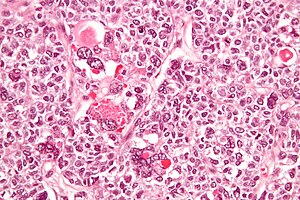Difference between revisions of "Juvenile granulosa cell tumour"
Jump to navigation
Jump to search
m |
|||
| Line 7: | Line 7: | ||
| Micro = microcystic spaces, cuboidal-to-polygonal cells in sheets or stands or cords, with moderate-to-marked nuclear atypia, and basophilic cytoplasm | | Micro = microcystic spaces, cuboidal-to-polygonal cells in sheets or stands or cords, with moderate-to-marked nuclear atypia, and basophilic cytoplasm | ||
| Subtypes = | | Subtypes = | ||
| LMDDx = [[Brenner tumour]], [[ | | LMDDx = [[Brenner tumour]], [[small cell carcinoma of hypercalcemic type]] | ||
| Stains = | | Stains = | ||
| IHC = inhibin +ve, calretinin +ve | | IHC = inhibin +ve, calretinin +ve | ||
Revision as of 14:11, 6 June 2016
| Juvenile granulosa cell tumour | |
|---|---|
| Diagnosis in short | |
 Juvenile granulosa cell tumour. H&E stain. | |
|
| |
| LM | microcystic spaces, cuboidal-to-polygonal cells in sheets or stands or cords, with moderate-to-marked nuclear atypia, and basophilic cytoplasm |
| LM DDx | Brenner tumour, small cell carcinoma of hypercalcemic type |
| IHC | inhibin +ve, calretinin +ve |
| Molecular | trisomy 12 |
| Gross | mass lesion, solid |
| Site | ovary - ovarian tumours |
|
| |
| Associated Dx | endometrial hyperplasia, endometrioid endometrial carcinoma |
| Symptoms | +/-menorrhagia |
| Prevalence | uncommon |
| Prognosis | good to moderate (dependent on stage) |
| Treatment | surgery |
Juvenile granulosa cell tumour is an uncommon ovarian tumour in the sex cord stromal tumours group.
General
May secrete estrogen - can present with:
- Endometrial pathology, e.g. endometrial hyperplasia or endometrioid endometrial carcinoma.
- Precocious puberty.[3]
Prognosis - granulosa cell tumours (adult and juvenile):[1]
- Low-stage: 97% five year survival.
- High-stage: 67% five year survival.
Gross
- Classically solid.
Microscopic
Features:
- Microcystic spaces.
- Moderate-to-marked nuclear atypia.
- Cuboidal-to-polygonal cell in sheets or stands or cords.
- Basophilic cytoplasm.
Notes:
- Juvenile variant of GCT has more nuclear pleomorphism.
DDx:
Images
IHC
- Inhibin positive.[5]
- Inhibin negative in Brenner tumour.
- Calretinin +ve.
- Ki-67 <5% (12/12 cases[6]).
- CD34 -ve (0 +ve/12 cases[6]).
- Vimentin +ve (11 +ve/12 cases[6]).
- CD99 +ve.[7]
Molecular
- Currently not used for the diagnosis.
See also
References
- ↑ 1.0 1.1 Oztekin, D.; Kurt, S.; Camuzcuoglu, H.; Balsak, D.; Dicle, N.; Tinar, S.. "Granulosa cell tumors of the ovary: review of 43 cases.". J BUON 17 (3): 461-4. PMID 23033282.
- ↑ URL: http://path.upmc.edu/cases/case631.html. Accessed on: 26 January 2012.
- ↑ Hashemipour, M.; Moaddab, MH.; Nazem, M.; Mahzouni, P.; Salek, M. (Jul 2010). "Granulosa cell tumor in a six-year-old girl presented as precocious puberty.". J Res Med Sci 15 (4): 240-2. PMID 21526089.
- ↑ Bárcena, C.; Oliva, E. (Nov 2011). "WT1 expression in the female genital tract.". Adv Anat Pathol 18 (6): 454-65. doi:10.1097/PAP.0b013e318234aaed. PMID 21993272.
- ↑ Cotran, Ramzi S.; Kumar, Vinay; Fausto, Nelson; Nelso Fausto; Robbins, Stanley L.; Abbas, Abul K. (2005). Robbins and Cotran pathologic basis of disease (7th ed.). St. Louis, Mo: Elsevier Saunders. pp. 1102. ISBN 0-7216-0187-1.
- ↑ 6.0 6.1 6.2 Kondi-Pafiti, A.; Grapsa, D.; Kairi-Vassilatou, E.; Carvounis, E.; Hasiakos, D.; Kontogianni, K.; Fotiou, S. (2010). "Granulosa cell tumors of the ovary: a clinicopathologic and immunohistochemical study of 21 cases.". Eur J Gynaecol Oncol 31 (1): 94-8. PMID 20349790.
- ↑ Schmidt, D.; Kommoss, F. (May 2007). "[Diagnosis and differential diagnosis of granulosa cell tumor].". Pathologe 28 (3): 195-202. doi:10.1007/s00292-007-0908-8. PMID 17387475.
- ↑ Schofield, DE.; Fletcher, JA. (Dec 1992). "Trisomy 12 in pediatric granulosa-stromal cell tumors. Demonstration by a modified method of fluorescence in situ hybridization on paraffin-embedded material.". Am J Pathol 141 (6): 1265-9. PMID 1466394.
- ↑ Mayr, D.; Kaltz-Wittmer, C.; Arbogast, S.; Amann, G.; Aust, DE.; Diebold, J. (Sep 2002). "Characteristic pattern of genetic aberrations in ovarian granulosa cell tumors.". Mod Pathol 15 (9): 951-7. doi:10.1097/01.MP.0000024290.55261.14. PMID 12218213.


